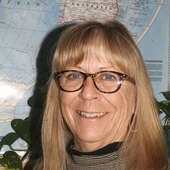- Research tips and McCook Brick Company- solid as a brick (12/16/24)
- Big Give appreciation and some railroad characters (11/15/24)
- George Randel becomes a landowner, gets married, and takes in a Buffalo Bill show (9/20/24)
- The memoirs of George F. Randel, early settler of Red Willow County (9/12/24)
- Vietnam War Memorial honors Nebraskans who served (6/13/24)
- McCook business promotions - just prior to 1893 stock market crash (5/30/24)
- Shall we dance? Meet you at the Gayway (12/8/23)
McCook’s first city manager in 1950
Friday, October 21, 2022
I am intrigued by questions that I not only can’t answer but actually never gave much thought to. This week, I was asked when McCook changed from electing a mayor to run the city. I was somewhat close on when that had occurred but hadn’t really studied how or why the change was made.
Prior to 1950, McCook actually voted for council members by wards and elected a mayor by a majority vote of all citizens. No different that electing any other governmental official, the best man didn’t always win, and even if he did win, he wasn’t always up to the job (which was quite often his second job) and the actual day to day operation of our town fell on the department heads.
In January of 1948, McCook’s Junior Chamber of Commerce special committee headed by Jack Lilly declared that would continue to stress the council/manager form of government during the first quarter of 1948 and circulate a petition asking: “Shall the city of McCook adopt a council-manager form of government?”. They felt certain, since the Hutchinson, Kansas JCC took only three months to satisfy the requirements to have their petition placed on a ballot in a special election, that following McCook’s April election enough signatures would be gathered to hold an election on the question in McCook. They were a bit over optimistic.
January of 1949 rolled around and the McCook Gazette issue of January 13 carried this front page headline: “City Manager Petitions Will Be Pushed Here.” The following article revealed that the chairman of the program was now Fred Marsh and that the Jaycee’s would launch their final drive for signatures to petitions requesting such an election at a breakfast at Modrell’s Café. Enthusiasm ran high and the Jaycee’s announced that they would be sending teams on a house-to-house canvas hoping to reach the 500 signature goal. Nebraska weather had a different idea about walking from house-to-house in January. It wasn’t long before the organization announced that the petitions would be available at all business locations for anyone wishing to sign.
Sign they did, but it was 1950 before the results of an overwhelming 75% approval of changing to a city manager form of governance would go into effect. Charles F. Trinkle would be selected over 36 other candidates to head the city. The council would be reduced to 5 members who would be elected at large rather than by wards and they would in turn elected a mayor as the head of the council. It was determined that the mayor would be paid $300 per year and the councilmen $200 per year. (I can attest to the fact that amount did not change from 1950 through 1982.)
The Gazette’s immediate reaction was very supportive: “There are two or three things which Charles Trinkle, newly appointed City Manager of McCook, should understand as he assumes his new responsibilities. 1. That the people of McCook voted more than three to one for the City Manager form of government. 2. That in spite of his residence in Oregon, his residence in Kansas, and his experience in the Navy and the European and Pacific theaters during the war…..he is now at the head of one of the finest communities in the world. 3. That these responsibilities challenge the best ability and brains there are in the Municipal government. 4. That Mr. Trinkle comes into this community under the most favorable circumstances…the people welcome him three to one over thirty-six applicants from coast to coast….that here is an opportunity to demonstrate the efficiency of government. 5. That in the almost unanimous decision of the people he will work with such people as Art John, Mayor; Ray Klingner; Charles Scalla; Eileen Murray and J. E. Decker, who are certainly not only representatives of the best of this community but people who are familiar with the past, present and future problems of this community.” (I would like you to note that our very first councilwoman was Eileen Murray!)
Hats off to Charles F. Trinkle! I have a feeling he had his work cut out for him not the least of which was insuring that the outlying neighborhoods became part of the city as they wished to be.

